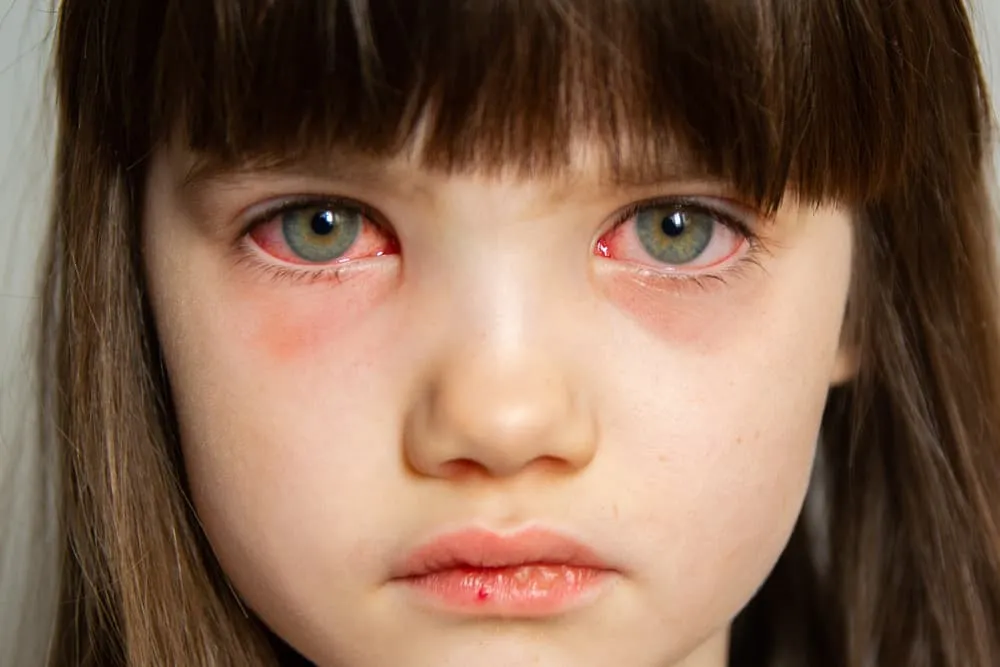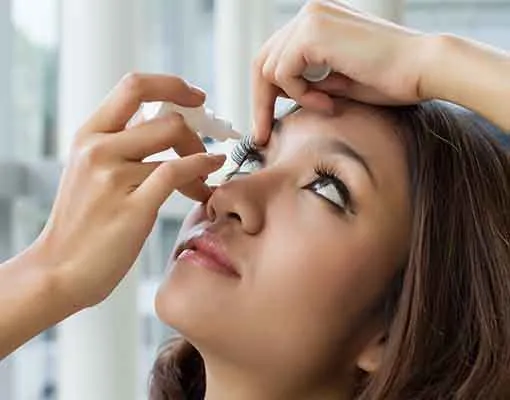Seasonal Eye Allergies
Prevention and Treatment Tips for Seasonal Eye Allergies
FSDAVCFEBFEVSDDVFSD
FSDAVCFEBFEVSDDVFSD
FSDAVCFEBFEVSDDVFSD
Combatting Eye Irritation During Allergy Season
Seasonal eye allergies can significantly impact daily life, causing discomfort and irritation. With the arrival of allergy season, many individuals experience symptoms such as redness, itching, tearing, and swelling. Addressing these symptoms promptly is vital for maintaining eye health during allergy season. Allergens like pollen, mold, and pet dander can trigger these reactions, making it important to recognize and manage them.
By identifying common triggers and implementing effective prevention and treatment strategies, you can manage eye allergies more effectively. Practical tips for preventing and treating seasonal eye allergies will help you enjoy the seasons with clear and comfortable vision. Taking proactive steps can significantly reduce discomfort and increase overall eye health.
Seasonal eye allergies can significantly impact daily life, causing discomfort and irritation. With the arrival of allergy season, many individuals experience symptoms such as redness, itching, tearing, and swelling. Addressing these symptoms promptly is vital for maintaining eye health during allergy season. Allergens like pollen, mold, and pet dander can trigger these reactions, making it important to recognize and manage them.

By identifying common triggers and implementing effective prevention and treatment strategies, you can manage eye allergies more effectively. Practical tips for preventing and treating seasonal eye allergies will help you enjoy the seasons with clear and comfortable vision. Taking proactive steps can significantly reduce discomfort and increase overall eye health.

What Are Eye Allergies?
Seasonal eye allergies, also known as allergic conjunctivitis, occur when the eyes react to allergens such as pollen, mold, dust, and pet dander. These allergens trigger an immune response, leading to eye allergy symptoms like itching, redness, tearing, and swelling. Seasonal eye allergies can be particularly bothersome during certain times of the year when specific allergens are more prevalent.
Recognizing the common causes of these allergies can help in identifying and avoiding potential triggers. By being aware of these allergens, you can take proactive steps to prevent eye allergies and reduce discomfort. Managing contact with these triggers is key to maintaining eye health during allergy season and promoting comfort throughout the year.
Causes of Eye Allergies
The primary causes of seasonal eye allergies include allergens such as pollen from trees, grasses, and weeds. During specific seasons, these allergens become more prevalent, leading to increased instances of eye allergy symptoms. Mold spores, both indoors and outdoors, also contribute to eye allergies, especially in damp environments. Dust mites and pet dander are common triggers that can exacerbate seasonal eye allergies.
Recognizing these causes is essential for managing and preventing discomfort. By reducing contact with these allergens, one can effectively manage symptoms and maintain eye health during allergy season. Practical measures include keeping windows closed during high pollen seasons, using dehumidifiers to reduce mold, and maintaining a clean living environment to minimize dust and pet dander.
How Are Eye Allergies Diagnosed?
Diagnosing seasonal eye allergies often begins with recognizing common eye allergy symptoms such as redness, itching, tearing, and swelling. A healthcare professional can confirm the diagnosis through a detailed medical history and a physical examination of the eyes. Sometimes, allergy testing may be recommended to pinpoint specific triggers.
Tests like skin prick tests or blood tests can identify the allergens causing the reaction. Accurate diagnosis is crucial for effective treatment and management, helping to tailor strategies that provide the most relief. By identifying the exact cause of eye allergies, one can better avoid triggers and seek appropriate treatments for lasting relief.
How Can I Prevent Eye Allergies?

Preventing seasonal eye allergies involves several practical steps to minimize contact with allergens. Staying indoors during peak pollen times can significantly reduce exposure to pollen. Keeping windows and doors closed, especially during high pollen seasons, helps keep allergens out of your home.
Using air purifiers with HEPA filters can reduce indoor allergens such as dust and pet dander. Regular cleaning, including vacuuming with a HEPA filter and washing bedding frequently in hot water, can also help control dust mites and mold.
Wearing sunglasses outdoors can protect your eyes from pollen and other airborne allergens, providing additional eye allergy relief. Personal habits like not rubbing your eyes, washing hands frequently, and showering after spending time outside can also help prevent eye allergies.

Maintaining a clean environment and practicing good hygiene are effective ways to keep allergens at bay and enjoy better eye health during allergy season. In addition to these preventative measures, over-the-counter and prescription medications can play a crucial role in managing symptoms of seasonal eye allergies. Antihistamine eye drops can provide quick relief from itching and redness by blocking the action of histamines, the chemicals responsible for allergy symptoms. Decongestant eye drops can reduce eye redness by shrinking blood vessels, although they should be used with caution and for a limited duration to avoid rebound effects. For more persistent or severe symptoms, prescription medications such as corticosteroid eye drops or oral antihistamines may be necessary, and consulting an eye care professional is recommended.
Treatments for Eye Allergies
Treating eye allergies effectively often involves a combination of over-the-counter medications, prescription treatments, and natural allergy remedies. Allergy eye drops containing antihistamines or mast cell stabilizers can provide quick relief from eye allergy symptoms such as itching, redness, and tearing. Oral antihistamines can also help reduce symptoms but may cause drowsiness in some individuals.
For more severe cases, a doctor may prescribe stronger medications such as corticosteroid eye drops to manage inflammation and provide long-lasting relief. Natural allergy remedies like cold compresses can soothe irritated eyes, and saline rinses can help wash away allergens. Regularly using these treatments can significantly improve comfort and reduce the impact of allergies on daily life. Consulting with an eye care professional can provide personalized recommendations for managing seasonal eye allergies effectively and ensuring optimal allergy eye care.
Managing Eye Allergies & See Eye Care Professional
Adopting healthy habits is essential in managing eye allergies. Staying hydrated helps keep the eyes moist, reducing irritation. Consuming foods rich in vitamins A, C, and E supports overall eye health and can help reduce inflammation. Limiting screen time and taking regular breaks during prolonged computer use can prevent additional strain on the eyes. Implementing these lifestyle changes, along with other treatment methods, can effectively manage seasonal eye allergies and maintain eye comfort throughout allergy season.
If eye allergy symptoms persist despite using preventive measures and over-the-counter treatments, it is important to consult an eye care professional. Severe symptoms such as intense itching, pain, or vision changes require immediate attention. A specialist can provide a tailored treatment plan, including prescription medications or specialized therapies, to manage chronic allergies effectively. Seeking professional advice ensures proper management of seasonal eye allergies and prevents long-term complications.
Adopting healthy habits is essential in managing eye allergies. Staying hydrated helps keep the eyes moist, reducing irritation. Consuming foods rich in vitamins A, C, and E supports overall eye health and can help reduce inflammation. Limiting screen time and taking regular breaks during prolonged computer use can prevent additional strain on the eyes. Implementing these lifestyle changes, along with other treatment methods, can effectively manage seasonal eye allergies and maintain eye comfort throughout allergy season.
If eye allergy symptoms persist despite using preventive measures and over-the-counter treatments, it is important to consult an eye care professional. Severe symptoms such as intense itching, pain, or vision changes require immediate attention. A specialist can provide a tailored treatment plan, including prescription medications or specialized therapies, to manage chronic allergies effectively. Seeking professional advice ensures proper management of seasonal eye allergies and prevents long-term complications.
Final Thoughts
Managing seasonal eye allergies effectively involves recognizing symptoms early, reducing contact with allergens, and using appropriate treatments. By following practical tips and consulting with eye care professionals, significant eye allergy relief can be achieved.
Regular eye exams and healthy habits play a key role in maintaining good vision and overall eye health during allergy season. Implement these strategies to enjoy clear, comfortable vision throughout the year. For expert advice and personalized care, visit Kleinwood Vision. Taking proactive steps can greatly reduce discomfort and enhance overall eye health.

Contact Info
Hours of Operation
Mon - Fri | 9:00 AM - 5:00 PM
Sat - Sun | Closed
Holiday Hours: We are closed for the following holidays: New Years Day, Memorial Day, Independence Day, Labor Day, Thanksgiving Day, Christmas Day
© 2026 Kleinwood Vision. All rights Reserved.


